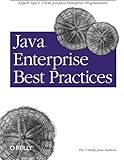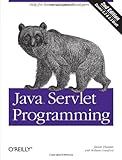Jason Hunter
Author of Java Servlet Programming

Jason Hunter is Principal Technologist with Mark Logic, specializing in large-scale XML content manipulation using XQuery. He's probably best known as the author of “Java Servlet Programming” (O'Reilly Media). He's also an Apache Member and as Apache's representative on the Java Community Process Executive Committee he established a landmark agreement allowing open source Java. He's publisher of Servlets.com and XQuery.com, an original contributer to Apache Tomcat (and Apache Ant committer), the creator of the JDOM open source project, a member of the expert groups responsible for Servlet, JSP, JAXP, and XQJ API development, and was recently appointed Sun Java Champion. In 2003, he received the Oracle Magazine Author of the Year award, and in both 2005 and 2006, the JavaOne Outstanding Talk award. His largest audience was 15,000 at a JavaOne conference keynote.
PRESENTATIONS
| Forgotten Web Algorithms |
| Greasemonkey: Ajax For One |
| New Features in Java 5 |
| Open Source from the Inside |
| Web Publishing 2.0 |
| What's New in Java 6 |
| XQuery By Example: Building an Email Archive System |
BOOKS
Java Enterprise Best Practices
Java developers typically go through four "stages" in mastering Java. In the first stage, they learn the language itself. In the second stage, they study the APIs. In the third stage, they become proficient in the environment. It is in the fourth stage --"the expert stage"-- where things really get interesting, and Java Enterprise Best Practices is the tangible compendium of experience that developers need to breeze through this fourth and final stage of Enterprise Java mastery.Crammed with tips and tricks, Java Enterprise Best Practices distills years of solid experience from eleven experts in the J2EE environment into a practical, to-the-point guide to J2EE.Java Enterprise Best Practices gives developers the unvarnished, expert-tested advice that the man pages don't provide--what areas of the APIs should be used frequently (and which are better avoided); elegant solutions to problems you face that other developers have already discovered; what things you should always do, what things you should consider doing, and what things you should never do--even if the documentation says it's ok.Until Java Enterprise Best Practices, Java developers in the fourth stage of mastery relied on the advice of a loose-knit community of fellow developers, time-consuming online searches for examples or suggestions for the immediate problem they faced, and tedious trial-and-error. But Java has grown to include a huge number of APIs, classes, and methods. Now it is simply too large for even the most intrepid developer to know it all. The need for a written compendium of J2EE Best Practices has never been greater.Java Enterprise Best Practices focuses on the Java 2 Enterprise Edition (J2EE) APIs. The J2EE APIs include such alphabet soup acronyms as EJB, JDBC, RMI, XML, and JMX.
Java Servlet Programming: Help for Server Side Java Developers (Java Series)
Aimed at Web developers with some previous Java experience, Java Servlet Programming, Second Edition, offers a solid introduction to the world of Java development with Servlets and related technologies. Thoroughly revised and newly updated with over a half-dozen new chapters, this title brings an already useful text up to speed with some leading-edge material. It excels particularly in explaining how to program dynamic Web content using Java Servlets, with a fine introduction to all the APIs, programming techniques, and tips you will need to be successful with this standard.Besides a useful guide to APIs, the book looks at a variety of techniques for saving session state, as well as showing how Servlets can work together to power Web sites. You will learn performance tips and ways to get Servlets to work together (like forwarding and redirection), plus the basics of database programming with JDBC, to build content with "live" data. A later chapter examines what's next for Servlets with the emerging Servlet 2.3 API standard. Importantly, the authors go over deploying and configuring Web applications by editing XML files, a must-have for successfully running Servlets in real applications.
Since the first edition of this title, the choices for Java Web developers have grown much richer. Many of the new chapters in this edition look at options beyond Servlets. Short sections on application frameworks such as Tea, WebMacro, the Element Construction Set (ECS), XMLC, and JavaServer Pages (JSP) let you explore what's out there for Java developers today with a survey of some current tools that can speed up creating new Web applications.
The text closes with reference sections on Servlet APIs (and other material) that will be useful for any working developer. Although Servlets are not the only game in town, they are still important tools for successful Web development. This updated edition shows you just how to do it with plenty of basic and advanced tips for taking full advantage of this powerful Java standard. --Richard Dragan
Topics covered:
- Overview and history of Java Servlets
- Fundamentals of HTTP
- Web applications (including deployment and configuration using XML files)
- The Servlet lifecycle (initializing, processing requests, cleanup, and caching)
- Multimedia content (images and compressed content)
- WAP and WML for wireless content
- Servlet session tracking techniques (hidden form fields, cookies, and URL rewriting)
- Security issues with Servlets (including certificates and SSL)
- Tutorial for JDBC and Java database programming
- Using applets and Servlets together
- Servlet collaboration
- Quick introduction to Java 2 Enterprise Edition (J2EE)
- Internationalization issues
- Survey of third-party Servlet application frameworks and tools: Tea, WebMacro, the Element Contruction Set (ECS), XMLC, and JavaServer Pages (JSP)
- Miscellaneous tips for Servlets (including sending e-mail and using regular expressions)
- Description of the new Servlet 2.3 API spec
- Servlet API quick reference


